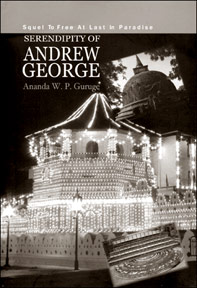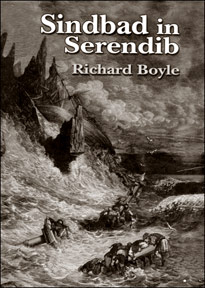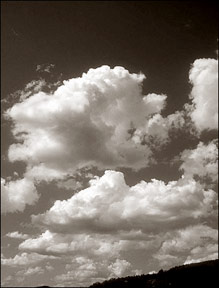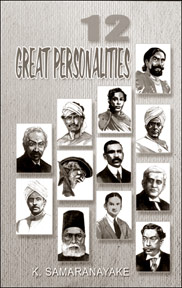|

Once upon many times
Serendipity of Andrew George
By Ananda W.P Guruge
Godage International Publishers (Pvt) Limited
Reviewed by Aditha Dissanayake
[email protected]
Resolution: I will not come between you and Andrew George. I will do
nothing to break the fascination you are bound to feel when you get to
know about Andrew’s quest to find his roots. I will leave you to
discover for yourself if this journey proves to be something similar to
Alex Hailey’s Roots, or not.
 Nor would I stop you from aching for Andrew when you get to read he
is seeking a change of scene to soften the “blow of a broken
relationship”. Would he find the love of his life within the 696 pages
of Prof. Ananda Guruge’s Serendipity of Andrew George? Keep your fingers
crossed. Nor would I stop you from aching for Andrew when you get to read he
is seeking a change of scene to soften the “blow of a broken
relationship”. Would he find the love of his life within the 696 pages
of Prof. Ananda Guruge’s Serendipity of Andrew George? Keep your fingers
crossed.
Leave my pen off Andrew, and you might think I will have very little
left to write on. Wrong. There are two protagonists here. Andrew and the
country he at first, vaguely remembers as an island close to India but
later calls the land of the “smiling Brownies” - a country where the
people “live not between the old world and the new.. but in a happy
position where they can reach for the best in both worlds at one and the
same time.
This is the secret of their happiness. No wonder they are always
smiling, if not laughing”. The book is an attempt to describe, sum up
and embrace Ceylon by mixing a fictional story line with actual facts
and real life characters. This is more her story than this is Andy’s.
Focusing as it does with a lens sharp enough to capture the minutest
details of the country, from the affluent rural communities in Colombo
to the North of the island along the west coast, if any work of fiction
can be strong enough to transcend the bridge between the west and the
South Asian soul ,it is surely this wonder of a book. Here is what the
writer seems to say “Let me take you through a journey beyond
imagination. Let me tell you a story”.
And what a story it turns out to be. Though not a nail biter, a page
turner, and certainly not “unputdownable”, here is a story to be enjoyed
in small doses, basking in the soothing knowledge there will be no
unpredictable twists, cynical political analysis or judgemental,
negative statements either about the events or about the characters, all
of whom possess charm and wit.
It is pleasingly amusing to find the only character who has a rough
edge (if it could be called that) is Professor Guruge, himself. He does
not initially, invite Andrew to call him by his first name, “he is
distant and his overly polite and formal behaviour irks some people”.
Hardly ever do we come across an author portraying himself in the
third person, and willingly having the other characters criticize him as
does Prof. Guruge in Andrew George.
The story unfolds through a narrative frame work, reminiscent of
Chaucer and the Canterbury Tales or, dating even further back in history
to the Panchatantra. Different characters take up the story at different
times breaking the monotony and adding colour to a snapshot of the
tumultuous past, which would otherwise have been a dull grey.
From the “smiling little undergraduate” whose name Andrew could not
pronounce or spell at that early stage, to “the old monk who had
dedicated the best years of his life to bring hope and meaning to a
dying village” to Sepala’s wife, “whose attainments in literature might
be as praiseworthy as those in the realm of culinary skill”help make an
impression “far beyond the size of their island nation”.
Food. From the exotic to the not-so-exotic, but never bland or
mundane, it is hard not to have your throat parched, when Andrew drinks
“the beverage served by nature to him in such a delightful container” -
a king coconut, making you yearn for one too, or restrain your mouth
from watering, your stomach from rumbling, reading about Egg-hoppers,
string-hoppers with fish curry, pol-kirihodi and lunu-miris, each seen
through the eyes of a stranger who had never tasted them before.
The Kiri-hodi to Andrew, is a bowl of soup, deep yellow in colour
with onions, bits of green chillies and curry leaves, he sees an egg
hopper as a pan-cake with a poached egg placed on it, and seeni-sambol
as onions with the inviting smell of sizzling bacon.
Not only foreigners, but the Westernised urbanites of the present
generation of Sri Lankans, who are used to fast food would find it
enthralling to read how most of these food is prepared.
Take for example, the preparation of string-hoppers, which Andy
feels, looks like “spaghetti or chow mien with the threads thinner and
arranged to form something like a circular pad”.
“Vijaya explained how string-hoppers were made with only rice-flour,
hot water and salt; that of course, did not include the more important
ingredients; technique, hard work and patience”.
Time and again the hospitality of the Sri Lankans is praised to the
blue skies, beginning with Andrew’s first Sri Lankan meal, served to him
in one of the most fashionable residential areas in London by Dr.
Malalasekara and his wife.
This is when he is introduced to “something which resembled crushed
cornflakes” with a nice smell. “Our ubiquitous national dish” the
hostess tells him and warns, “never believe if a Ceylonese invites you
to a meal of boiled rice” and this “salad” served in the humblest to the
most sophisticated homes”, because it is only a fancy statement of
self-depreciation”. Made with the scraped coconut kernel, woe be to you,
if you have not yet tated this elixir.
There is a lot here to keep your lips turned skywards. Here is how a
bit of useful information saves Andrew from many a moment of despair and
embarrassment. When Sepala shakes his head, Andrew interprets it as
“No”. But Vijaya explains “Sepala’s nod was a ‘yes’, Andy! That’s where
East and West will never meet. Our nod to signify the tentative or half
hearted affirmative is a negative to you”.
Yet, there is a lot here which is bound to make you wrinkle your
forehead and turn your lips down. That taboo subject. Caste. Even though
the social barriers had gradually crumbled in modern day Sri Lanka, the
end of all social distinctions is yet a dream. “Caste will never be
forgotten in marriage and in politics” affirms Vijay.
Even Andrew, with a gap of two generations and three American
ancestors does not go unscathed. He is the ‘descendent’ of an
“untouchable” and it takes an intelligent Sri Lankan girl to wipe away
the stain Andrew feels is on him by being a “one quarter outcaste”. It
is redeeming to hear Sita quote the Buddha. “One becomes an outcaste not
by birth but by actions”.
Here, finally is a novel where history and fiction is finely
balanced, with neither one overwhelming the other.
A work and a world that expands anybody’s vision of Sri Lanka, adding
colour to it and enhancing it with hope; i.e as predicted by the ‘jolly
professor” Dr. Weera Arthakatha, “If I am to write a poem I will call it
‘Ceylonese shall rule tree-tops”.
“We are like a multitude of bats. We have a folk-tale that says that
bats did not know whether they were birds or beasts. So in a great
struggle when it was found that birds were gaining ground they said, We
are birds - look at our wings”. When the beasts appeared to win, the
same bats joined them saying, “look at our teeth. We don’t lay eggs. We
nurse our young ones”. So are the Ceylonese - our adaptability is our
greatest asset.
‘We shall never despair. We shall never die. And what’s more - we
shall rule the tree tops”. On a more serious level here is Andrew’s
realization “Whether in a jungle of brick and masonry, metal and glass,
bridges and roads...man belonged to one single family, and looked for
the same things, experienced the same pains and pleasure, and
entertained the same hopes and aspirations.”
In the end, here is a brave, honourable work which provides not only
mere entertainment but goes beyond. It teaches. Don’t miss it.
Indescribable Serendib
Sindbad in Serendib
By Richard Boyle
Visidunu Prakashakayo (Pvt) Limited
By Nilma Dole
[email protected]
 It is not often that one comes across a book that easily influences
one’s train of thought and has been instrumental in igniting passion to
read further. Upon reading ‘Sinbad in Serendib’ by Richard Boyle, it
greatly enlightened me about the rich history and language derivations
pertaining to Sri Lanka and as it is more famously known - ‘Serendib’ or
‘Serendipity’. It is not often that one comes across a book that easily influences
one’s train of thought and has been instrumental in igniting passion to
read further. Upon reading ‘Sinbad in Serendib’ by Richard Boyle, it
greatly enlightened me about the rich history and language derivations
pertaining to Sri Lanka and as it is more famously known - ‘Serendib’ or
‘Serendipity’.
In the 1001 Arabian Nights collection, the story of the ‘Sixth
Wonderful Voyage of Sinbad the Sailor’ eloquently relates Sinbad’s
account of Serendib: “A beautiful country lay before me, and my raft
which was tied to the bank, was surrounded by friendly looking Indians.
I rose and saluted them and they spoke to me in return but I could
not understand a word of their language. Feeling perfectly bewildered by
my sudden return to life, I murmured to myself in Arabic ‘Close thine
eyes, and whilst thou sleepest Heaven will change thy fortune from evil
to good’.
One of the natives who understood this tongue then came forward
saying “My brother, be not surprised to see us, we are the husbandmen
and tillers of the soil who came out to water our fields and
plantations. We confronted your raft floating on the river and one swam
out and brought you to shore”.
Like so, the Serendib hospitality and kindness is evident from times
before to the time Sinbad journeyed here and he also gives a brilliant
description of how blessed the island is with Mother Nature’s bounty “As
it was the place where Adam was banished out of Paradise, I had the
curiosity to ascend to its summit and solace myself with a view of its
marvels, which are indescribable.
Here are found rubies and many precious things and rare plants grow
abundantly with spice trees and cocoa palms.
On the seashore and at the mouths of rivers the divers seek for
pearls and in some valleys precious stones are plentiful.” The voyage of
‘Sinbad in Serendib’ has the facts clearly explained in the book because
the stories of Sinbad today have been created and have been painted over
to make it more palatable.
The essay that really fuelled inspiration was ‘Mermaid Myth, Dugong
Reality’ which invokes a sense of yearning to dig into this more, since
this wonderful mammal is now facing extinction.
The dugong mammal or manatee has sparked off the mermaid myth because
the suckling of its young and the human-like features seen at a distance
is similar to that of a beautiful female mermaid. Also, it doesn’t help
that before in earlier times, the meat of the dugong was so tender and
succulent that there was much killing of it.
In the book, the historical account has it that King Parakramabahu’s
beautiful daughter Navaratnavali or Ratnavalli has a desire for human
flesh.
According to the book “The facts then came to light, and the King,
stripping his daughter of her ornaments, and calling up a scavenger then
sweeping out a neighbouring yard gave her to him as wife and drove her
out to earn her living in her husband’s class”.
The Rodi women weren’t allowed to cover their upper body which left
their breasts clearly exposed and which made early foreign settlers lust
after these sensual women as subjects of ‘Victorian pornography’.
Also, the Nittaewo people as related in the essay ‘The Nittaewo:
Dagger -Clawed Little People’ focuses on the Neantherdal people who were
inhabitants of the island and who fought much with the ‘Veddah’ people,
the dominant race in Serendib.
Stories like ‘Horace Walpole, Serendipity and The Three Princes’ and
‘The Anaconda of Ceylon’ draw facts on the language styles and origins
of certain words used in English from the Sri Lankan languages - Sinhala
and Tamil.
For more information, Boyle’s previous book ‘Knox’s Words’ will give
valuable insight. Stunning breath-taking places like those described in
the essays ‘In Quest of the Great Ruby’, ‘Galle in its Heyday’,
‘Ritigala: The Enigmatic Mountain’, ‘Mulgirigala: Rock of Ages’, as with
artistic expressions highlighted by ‘Ernst Haeckel’s Island of Marvels’
certainly show how pleasant the geography of Serendib has been from
years ago. Further interesting stories like ‘Tales of the Giant Squid’,
‘The Cobra Files’ and ‘Of Pearls and Pearl Fisheries’ reflect on the
adventures of travellers and inhabitants in Serendib.
The essay ‘C.G. Jung’s Field of Vision’ is one of the better essays
because it clearly states C.G.Jung’s dream where he saw and describes
Serendib like the satellite picture of Sri Lanka and part of India taken
by NASA on the ‘Gemini 11 mission’ in 1966.
In every sense of the word, Richard Boyle has delved deep into the
archives which have taken him around the world inspired by the late
H.A.I. Gonnetileke’s ‘A Bibliography of Ceylon’, Andrew Robinson’s
‘Description of the Anaconda’ and various contributions by the late
renowned Sir Arthur C. Clarke, R.K. de Silva, Ismeth Raheem, Manik
Sandrasagra, Bill Alpine, Jeanne Pinto, Swarni Shiva Kalki and Mahen
Vaithianathan. Much of his findings and research have taken him years to
uncover and fit the missing pieces like a jigsaw puzzle. This is the
best gift Richard Boyle has presented to Sri Lanka where he has been
resident for nearly 30 years.
A cloud in my heart
Not the last words, but...
by Aditha Dissanayake
[email protected]
 “Don’t be dismayed at goodbyes. A farewell is necessary before you
can meet again. And meeting again, after moments or lifetime, is certain
for those who are friends.” - Richard Bach “Don’t be dismayed at goodbyes. A farewell is necessary before you
can meet again. And meeting again, after moments or lifetime, is certain
for those who are friends.” - Richard Bach
Had this column being written by hand today, the words would be
jumbled and hardly readable - you would only have had to glance at the
handwriting to realize Aditha is having a bad day today. You will shake
your head compassionately (I hope) and turn to JJ’s Sunday Crime or move
onto Sajitha’s Passionate Pen. Don’t let me stop you.
Yes, I am not quite here with you this Sunday. My poor scrambled
brain is not in working mode today and I am sure I will be squeezing out
vaguely understandable sentences. So, today, don’t expect anything too
insightful please.
Here is the explanation. I am leaving. I am leaving home, the
greatest place on earth, for two years, and The Sunday Observer,
temporarily. This will be the last day I will hold fort at Writer’s Den.
The key of the “Den” from next week will be with one or the other of my
colleagues, if they wish to continue. They might have their own ideas of
how to do the book reviews page and I wish them luck.
Click the calendar back by three years and you will find how Writer’s
Den was built plank by plank, tile by tile, to provide a home for every
scribe in Sri Lanka, poet, novelist, historian, writing in English,
Sinhala or Tamil.
Harsh criticism of a creative work, with no kind of humanity involved
was avoided as much as possible believing in the doctrine however much
we need criticism we need it in a gentle voice. - a voice, aimed for
genuine, informed, passionate discourse about literature - a voice,
expressive, precise and above all, wholly human.
Dear Reader, my fondest hope today is that every Sunday when you
stepped into Writer’s Den during the past three years you found yourself
always riveted and never perplexed; enlightened and never unsatisfied.
It was such a pleasure to have got to know you, to have reached out and
“connected”.
But now, its time to let go. Adieu. Let me part seeking solace in
Richard Bach’s words - miles truly can’t separate us. “If you want to be
with someone you love aren’t you already there?”
Book News
The Gratiaen Prize and State Literary Award-winning book, The Banana
Tree Crisis, by Isankya Kodithuwakku will be felicitated and reviewed in
a ceremony, “Viewpoints on The Banana Tree Crisis,” to be held in
Colombo on Tuesday, July 15th.
The event will be addressed by Professors Ashley Halpe and K.N.O.
Dharmadasa as well as by author, Vivimarie Vanderpoorten, who was one of
the judges of the Gratiaen Prize when it was awarded to the book. The
publisher, Vijitha Yapa, will also speak at the event while the author,
Isankya Kodithuwakku, will read from the book.
The Banana Tree Crisis was published in August 2006 and had the
unprecedented achievement of being awarded both the Gratiaen Prize and
the State Literary Award. The book won the State prize in the Short
Story category. It is currently in its third printing.
Salute to our national heroes
 It is common knowledge that today most people, particularly those of
the younger generations, know very little about national heroes and
patriots of our country even of the not too distant past. The main
reason for this situation is that books and information about them, are
not readily available. Although there are biographies of some of them,
they are not easily accessible to the general reader as well as school
children. It is common knowledge that today most people, particularly those of
the younger generations, know very little about national heroes and
patriots of our country even of the not too distant past. The main
reason for this situation is that books and information about them, are
not readily available. Although there are biographies of some of them,
they are not easily accessible to the general reader as well as school
children.
The writer who has previously written a very useful book on the
“Famous Kings of Ancient Sri Lanka”, has now compiled this book
containing brief biographical sketches of some of the most outstanding
personalities of Sri Lanka during the Colonial era. He has taken great
pains to gather little known and almost forgotten information about
them.
I consider this as a timely and much needed book, well written and
attractively produced and I have no hesitation in recommending it to
school children as well as Teachers, specially those teaching the
subject of social studies. The general reader would also find this book
informative and interesting.
-Professor Mendis Rohanadeera |
